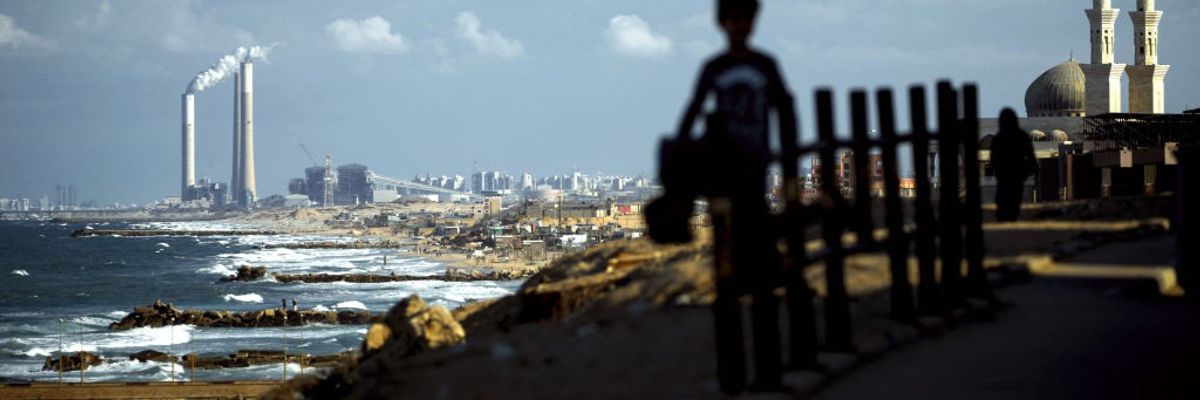Oil Change International on Tuesday released a report detailing fossil fuel transfers to Israel since its siege of Gaza began in October, arguing that the countries and companies responsible, which include the United States and U.S.-based multinationals, could be held liable for contributing to "acts of genocide" under international law.
Azerbaijan, Kazahstan, and Gabon are major suppliers of crude oil to Israel, as are Big Oil companies such as BP, Chevron, ExxonMobil, and Shell, according to the report, which comes from data that the U.S.-based advocacy group commissioned from Data Desk, an investigative consultancy.
Data Desk tracked 65 shipments of petroleum products delivered to Israel between late October and mid-July, more than half of which were sent after the International Court of Justice ruled on January 26 that Israel must take steps to prevent acts of genocide in Gaza and that some of Israel's acts "appear to be capable of falling within the provisions of the [Genocide] Convention"—part of an ongoing judicial process.
"Corporations supplying jet fuel and oil to Israel may be providing material support to the military, aware of its foreseeable harmful effects, and therefore risk complicity in war crimes, genocide, and other crimes under international law," Irene Pietropaoli, a fellow in business and human rights at the British Institute of International and Comparative Law, said in a statement.
While human rights groups have long called for an arms embargo on Israel and progressives in the U.S. have pushed the Biden administration to stop supplying weapons, there has been less focus on the energy supply chain that makes the destruction in Gaza possible.
The U.S. supplies JP-8 jet fuel that's used in Israeli warplanes, the report says. The fuel travels from a Valero refinery in Corpus Christi, Texas, to Israel via tanker. A recent shipment on a U.S.-registered tanker was the subject of controversy in Europe, where there was pressure to forbid it from docking.
Mark Muenster, an organizer in Corpus Christi, said in the statement that he was "upset and disgusted" that the refinery there was supplying jet fuel to Israel, arguing that the negative local impact of Valero's work, which he said included pollution and resource depletion, was bad enough.
Israel, which has refineries but relies on imports for raw energy, gets it from all over the world. Azerbaijan, the host of this year's COP29 climate summit, provided Israel with 28% of its crude oil during the study period, sending it through the Baku-Tbilisi-Ceyhan pipeline, which is majority-owned and operated by BP. Kazakhstan and Gabon each supplied another 22%. Brazil contributed 9%, even though it's led by President Luiz Inácio Lula da Silva, a left-leaning critic of Israel's war.
Lula "has the opportunity to help bring about a cease-fire by pursuing an oil embargo," the report says.
Mahmoud Nawajaa, general coordinator of the Boycott, Divestment, and Sanctions (BDS) movement in Gaza and the West Bank, didn't name Brazil or any other country but spoke harshly of countries that continued supplying Israel with fuel.
"It is unconscionable that in the midst of Israel's genocide against 2.3 million Palestinians in Gaza, governments that publicly condemn the genocide and support Palestinian rights as stipulated in international law continue business as usual with apartheid Israel, supplying it with energy and profiting from its crimes," he said in the statement. "The BDS movement calls for escalating grassroots and civil society pressure to make those hypocritical governments stop their complicity in Israel's mass murder and starvation of Palestinians."
The report cites Colombia as a model. The country's coal has accounted for about half of Israel's coal imports, but President Gustavo Petro just issued an embargo. He explained on social media that "Colombian coal is used to make bombs to kill Palestinian children."
The report's country-by-country breakdown overlaps with the company-by-company breakdown, as multinationals work all over the world. Chevron, BP, ExxonMobil, Shell, Eni, and TotalEnergies together accounted for 35% of Israel's crude oil supply.
Tuesday's report was an update of one that Oil Change International issued in March, which Common Dreams reported on at the time.



